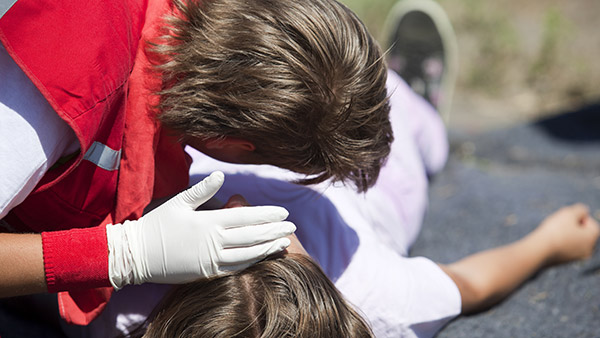Introduction
In our fast-paced world, emergency situations can hltaid012 Child Care First Aid Courses Near Me strike without warning. Whether it's a minor injury, a medical emergency situation, or a life-threatening circumstance, understanding just how to give first aid can make all the difference. This is where a First Aid course enters play. Lots of people may wonder what they can gain from such training, and this article aims to clarify that.

By joining in a First Help and CPR course, you do not just discover wrapping wounds or doing CPR; you equip on your own Visit this website with indispensable abilities that can conserve lives. So, just what will you learn in a comprehensive course? Allow's dive into the details.
First Help Basics: What You'll Find out in a Thorough Course
Understanding Initial Aid
What is First Aid?
First help refers to the initial help provided to somebody suffering from an injury or ailment up until expert medical assistance arrives. It incorporates different techniques and skills ranging from simple wound care to lifesaving methods like CPR (Cardiopulmonary Resuscitation).
Importance of First Aid Training
Why Must You Take a First Aid Course?
Taking a First Help course is important for several reasons:
- Confidence: Recognizing exactly how to react in emergency situations can impart confidence. Life-Saving Abilities: The capacity to do CPR or help with choking can conserve lives. Career Innovation: Lots of occupations call for qualification in initial aid. Community Duty: Learning ways you can assist others effectively.
Overview of CPR
What is CPR?
CPR, or Cardiopulmonary Resuscitation, is an emergency situation treatment done when somebody's heart beat or breathing has stopped. It integrates breast compressions with rescue breaths to keep blood circulation and oxygenation till specialist assistance arrives.
The Framework of a Comprehensive Emergency Treatment Course
What Does a First Aid Course Include?
A well-shaped First Aid and CPR course usually covers the following topics:
Introduction to First Aid Legal and Honest Considerations Scene Safety Basic Life Assistance (BLS) CPR Techniques Choking Relief Wound Care Management Burn Treatment Managing Shock Recognizing Clinical Emergencies Using an Automated External Defibrillator (AED)Legal Aspects of First Aid
Are There Legal Ramifications Involved in Providing First Aid?
Yes, offering first aid does carry legal duties referred to as "Do-gooder legislations." These regulations protect individuals that aid others in emergencies, gave their actions are sensible and not reckless.
Scene Safety: The Initial Step
How Do You Guarantee Scene Safety?
Ensuring scene safety includes assessing the environment before approaching the victim:
- Look for possible threats (traffic, fire). Make certain it's risk-free for both you and the victim.
Basic Life Assistance (BLS)
What Role Does BLS Play in Emergency Situations?
Basic Life Support includes the fundamentals of preserving life features till further clinical assistance shows up. This area covers important skills such as:

- Checking responsiveness Activating emergency solutions Performing top quality upper body compressions
Advanced mouth-to-mouth resuscitation Techniques
What Are Advanced Techniques Covered in Mouth-to-mouth Resuscitation Courses?
Advanced methods may include:
- Two-rescuer CPR Use of obstacle devices for rescue breaths Special factors to consider for babies and kids
Choking Alleviation Techniques
How Do You Assist Somebody Who is Choking?
Choking relief includes two essential strategies:
The Heimlich maneuver for adults. Back strikes and chest thrusts for infants.Wound Treatment Management
How Do You Appropriately Handle Wounds?
Effective injury management includes:
- Cleaning the wound with saline or clean water. Applying antibiotic ointment. Covering it with sterile dressings.
Burn Treatment
What Work Methods for Dealing With Burns?
Burn treatment varies by level:
Cool the shed under running water. Cover it with non-stick dressings. Seek medical interest for severe cases.
Managing Shock
How Is Shock Identified and Treated?
Recognizing shock consists of trying to find signs and symptoms like pale skin, fast pulse, or complication:
Lay the person down. Elevate their legs unless there are injuries protecting against this. Keep them soothe up until aid arrives.Recognizing Clinical Emergencies
What Sorts of Medical Emergencies Ought To You Understand Of?
Common medical emergency situations include: http://dallasyxyu728.raidersfanteamshop.com/day-care-first-aid-training-key-techniques-every-parent-need-to-know
- Heart attacks Stroke Severe allergic reactions Recognizing these problems aids you act quickly.
Using an Automated External Defibrillator (AED)
How Do You Make use of an AED Correctly?
Using an AED includes turning it on, attaching pads according to pictures on the gadget, and adhering to voice motivates carefully.

Importance of Constant Learning
Why Is Constant Discovering Important in Emergency Treatment Training?
Continuous understanding guarantees you stay updated on best methods and brand-new protocols in first aid care.
FAQs Concerning Emergency treatment Courses
What Is Consisted of in a Standard First Aid Course?- A standard training course typically covers basic life assistance, injury administration, choking alleviation strategies, and lawful considerations.
- Most courses vary from 6 hours to 16 hours depending upon the depth of content covered.
- Yes, upon successful conclusion of many programs, individuals get a first help certificate, which is usually valid for two years.
- Yes! Several organizations provide online programs that provide versatile discovering environments while still being effective.
- Absolutely! Hands-on technique is important for mastering skills like upper body compressions and using AEDs effectively.
- Generally, there are no age limitations; nevertheless, participants should be psychologically competent to find out these life-saving skills effectively.
Conclusion
Enrolling in a thorough first aid course equips people with vital understanding that can conserve lives during emergency situations-- whether in the house, work, or out in public spaces! From recognizing standard life assistance treatments such as mouth-to-mouth resuscitation to learning just how to handle injuries effectively or recognize signs of shock-- these programs give very useful training that anyone can profit from!
As we navigate through our day-to-days live filled with changability-- what better way than preparing ourselves with expertise gained from organized training sessions concentrated on saving lives?
In conclusion-- if you're pondering using up any type of type of first-aid training-- never hesitate! Equip yourself today with these effective devices because readiness absolutely makes all the difference when every second counts!